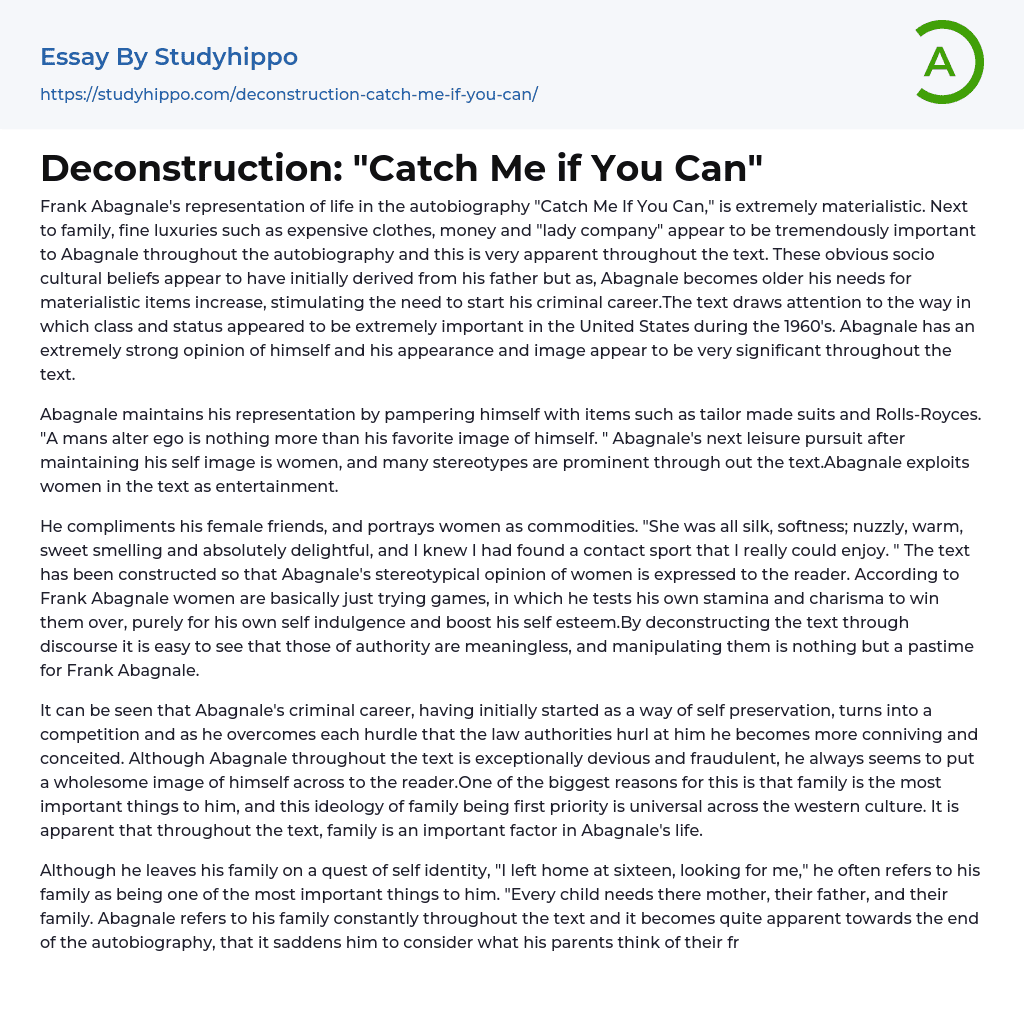The autobiography "Catch Me If You Can" by Frank Abagnale presents a highly materialistic portrayal of life. Alongside valuing family, Abagnale places great importance on luxuries like expensive clothing, money, and having "lady company." These values seem to have originated from his father but grew stronger as Abagnale aged, leading him to embark on his criminal career. The text highlights the significance of class and status during the 1960s in the United States. Abagnale displays a strong sense of self-importance and places great emphasis on his appearance and image throughout the text.
Abagnale prioritizes his representation by indulging in luxury items, including bespoke suits and Rolls-Royce cars. He believes that a person's alter ego reflects their idealized self-image. In addition to cultivating his image, Abagnale pursues women as a leisure activity, perpetuating various stereotypes throughout the text. He
...objectifies women for his own entertainment.
Frank Abagnale expresses stereotypical views of women, complimenting their physical attributes and treating them as commodities. He describes one woman as "all silk, softness; nuzzly, warm, sweet smelling and absolutely delightful," viewing her as a contact sport to boost his self-esteem. Through discourse analysis, it becomes clear that Abagnale disregards authority and sees manipulating women as a mere pastime.
Throughout the text, Abagnale's criminal career evolved from self-preservation to a competitive pursuit. As he overcame each hurdle the law authorities threw at him, he became more wily and arrogant. Despite his deceitfulness and fraudulence, Abagnale managed to portray a wholesome image of himself to the reader. One of the reasons for this is his strong belief that family comes first, a value shared by Western culture. Abagnale's life is clearly influenced by hi
family, as emphasized throughout the text.
Despite leaving home at the age of sixteen in search of his true identity, Frank Abagnale frequently emphasizes the importance of his family in his life, stating that "Every child needs there mother, their father, and their family." Throughout his autobiography, he continually references his family, and it becomes evident towards the end of the book that he is saddened by what they must think of him as a fraudulent son. Despite being a criminal, Abagnale's affection for his family is unexpected and serves to make him more relatable to readers. The text recounts Abagnale's extraordinary acts of forgery, impersonation, and escape artistry throughout history.
Frank Abagnale demonstrates that regardless of difficulties and setbacks, family ultimately prevails.
- Building essays
- Automotive essays
- Automotive Industry essays
- Commerce essays
- Construction essays
- E Commerce essays
- Grocery stores essays
- Paper Industry essays
- Pharmaceutical industry essays
- Pharmacy essays
- Polymers essays
- Real Estate essays
- Textile Industry essays
- Abnormal Psychology essays
- Abraham Maslow essays
- Attachment Theory essays
- Authority essays
- Behaviorism essays
- Classical Conditioning essays
- Cognitive Psychology essays
- Counseling essays
- Developmental Psychology essays
- Educational Psychology essays
- Erik Erikson essays
- Family Therapy essays
- Jean Piaget essays
- Maslow's Hierarchy Of Needs essays
- Mental Health essays
- Operant Conditioning essays
- Personality Psychology essays
- Positive Psychology essays
- Psychoanalysis essays
- Psychotherapy essays
- Sigmund Freud essays
- Social Psychology essays
- Stanford Prison Experiment essays
- Supersize Me essays




